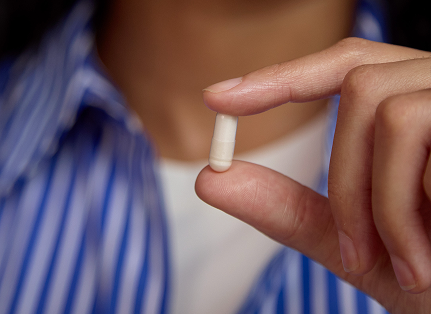
Discover the best PCOS supplements for weight loss, including inositol, NAC, and more. Support hormonal balance and insulin sensitivity naturally.
5 PCOS Supplements For Weight Loss
Losing weight with PCOS can feel like pushing a boulder to the top of Mt. Everest–nearly impossible. It’s not your fault. Due to PCOS, you’ve got hormonal imbalances, insulin resistance, and inflammation working against your efforts. You don’t have to go it alone; the right support system and supplements may help your body’s natural metabolism and make weight loss more achievable.
In this guide, we’ll dive into how supplements work, what research says, possible dosage guidance, and who may benefit most. Plus, you'll get tips on choosing high-quality vitamins and integrating them safely into your lifestyle. Let’s unpack how these tools fit into the broader picture of managing PCOS and regaining control over your body.
Why is it Difficult to Lose Weight With PCOS?
Weight loss is never easy, but weight loss with PCOS can feel like a relentless hurdle. The metabolic changes associated with PCOS, particularly high insulin and androgen (i.e., testosterone) levels, disrupt how the body handles glucose and fat storage.
Insulin Resistance
Women with PCOS are more likely to have insulin resistance, with some studies suggesting that 65-95% of women with PCOS also have the condition. Insulin resistance is when your body doesn’t respond well to insulin, which causes excess fat storage and a cycle of blood sugar spikes and increased appetite.
Hormonal Imbalance
One primary symptom of a hormonal imbalance is “unintentional or uncontrollable weight gain,” especially around the abdomen. Additionally, appetite changes can lead to overeating, while other symptoms like fatigue, chronic pain, and aches can make physical activity challenging.
Can Supplements Actually Help with PCOS Weight Loss?
If you've searched for the best supplements for PCOS weight loss, you’ve likely come across several recommendations. But do they really work? The evidence suggests that, when combined with a balanced diet and lifestyle, these supplements can support metabolic and hormonal health.
1. Inositol
Inositol is a compound both naturally produced in your body and found in fruits, beans, and whole grains, and it plays a key role in how your body processes insulin. For women with PCOS, this is a big deal.
What it is
It is a type of molecule that serves several purposes, including supporting cell growth and metabolism, as well as hormonal regulation.
The two most common forms of inositol are:
- Myo-inositol (MYO): The most abundant form of inositol, found naturally in beans, fruits, nuts, and grains.
- D-chiro inositol (DCI): DCI is produced from a chemical reaction between MYO and an enzyme. Its primary function is to convert sugar into energy, and it’s mostly found in the liver and fat stores.
How it helps with PCOS weight loss
Together, MYO and DCI help improve insulin sensitivity, support hormone balance, and can even aid in restoring regular ovulation and menstrual cycles. When your body properly regulates glucose, your blood sugar levels stabilize, which means fewer cravings and energy crashes, making it easier to stick to healthy eating habits.
Allara’s Myo-& D-Chiro Inositol combines Myo-Inositol and D-Chiro Inositol in the evidence-backed 40:1 ratio to support hormone balance, regular cycles, and healthy ovulation. This formulation promotes insulin sensitivity and targets the root causes of hormonal disruption, not just the symptoms.
2. N-Acetylcysteine (NAC)
N-acetylcysteine (NAC) is a supplement best known for its antioxidant properties. It has also gained attention for its role in supporting hormonal balance and metabolic health in women with PCOS.
What it is
NAC is a precursor (which means it helps create) of the amino acid L-cysteine, with a long history of therapeutic use. Your body uses NAC to produce the antioxidant glutathione, which helps neutralize free radicals–unstable molecules that can cause cellular and tissue damage.
How NAC Helps with PCOS Weight Loss
Like Inositol, NAC reduces and improves insulin resistance. It also reduces oxidative stress (caused by an imbalance in free radicals and antioxidants) and inflammation, two underlying issues that worsen PCOS symptoms. Additionally, NAC may lower testosterone levels and regulate menstrual cycles.
NAC is one of the primary ingredients in our Anti-Inflammatory Support supplement. Along with Curcumin, an active compound found in turmeric known for it’s anti-inflammatory properties, it helps fight low-grade inflammation and oxidative stress.
3. Berberine
Dubbed “nature’s metformin,” berberine has quickly become a go-to natural supplement for PCOS. Why? Because research suggests that it works in a similar vein as metformin, which is often prescribed to women with PCOS.
What it is
Berberine is a plant compound used in Ayurvedic and traditional Chinese medicine (TCM). TCM practitioners like berberine for its anti-inflammatory, antioxidant and antibacterial properties. It’s been used to treat a variety of conditions over the years, most notably gastrointestinal issues.
How it helps with PCOS weight loss
Like metformin, Berberine reduces insulin resistance and improves insulin sensitivity. It’s also been shown to:
- Improve glucose metabolism
- Encourage fat loss
- Lower cholesterol and inflammation
One study found it to be as effective as metformin in improving insulin resistance, lowering testosterone, and reducing BMI in women with PCOS.
Allara’s Metabolic Essentials includes 750mg of berberine, meant to target insulin inflammation and metabolic dysfunction.
4. Omega-3 Fatty Acids
Insulin and glucose tend to dominate the conversation around weight loss and PCOS, but there’s a hidden roadblock: inflammation. That’s where omega-3 fatty acids can help.
These healthy fats, found in fatty fish like salmon and mackerel (or algae-based supplements for plant-based folks), are well-known anti-inflammatory agents that can help calm the systemic inflammation associated with insulin resistance, high androgen levels, and metabolic dysfunction in PCOS.
What they are
Omega-3 fatty acids are a type of polyunsaturated fat, AKA the healthy fat. We don’t naturally produce these essential fatty acids, so we must either obtain them through our diets or via supplements.
There are two types noted for their anti-inflammatory benefits:
- Eicosapentaenoic acid (EPA): A fatty acid found primarily in fish.
- Docosahexaenoic acid (DHA): A fatty acid mostly found in fish and algal oils.
How they help with PCOS weight loss
In a clinical study, omega-3 supplementation significantly reduced triglyceride levels (another type of fat stored in fat cells) and improved insulin sensitivity. It also lowered testosterone levels, which can help support better hormonal balance and reduce PCOS symptoms, such as acne and unwanted hair growth.
5. Vitamin D
Vitamin D is commonly overlooked for women with PCOS, but it’s an essential nutrient. Often called the “sunshine vitamin,” vitamin D plays a crucial role in hormonal regulation, insulin sensitivity, and even mood regulation.
Vitamin D Deficiency
Vitamin D is one of the most essential nutrients for women’s health, but many women are deficient, especially women of color and women ages 20-29. Studies estimate that up to 85% of women with PCOS have low levels of this crucial nutrient.
Low vitamin D levels have been linked to higher insulin resistance, increased belly fat, and more severe PCOS symptoms.
How it helps with PCOS weight loss
Optimized vitamin D levels can regulate blood sugar and insulin more effectively. One study found that vitamin D supplementation significantly improved insulin resistance and reduced inflammation markers in women with PCOS.
Other research suggests that correcting a deficiency may help restore menstrual regularity, reduce testosterone levels, and improve mood and energy.
What About Other Supplements?
The above supplements may be the most studied as the best supplements to help with PCOS symptoms, but there’s emerging research about other nutrients as well:
- Magnesium: Magnesium plays a key role in glucose metabolism, and supplementing with magnesium can support insulin sensitivity, reduce the risk of heart disease, and ease stress and PMS symptoms.
- Zinc: Studies suggest women with PCOS often have lower zinc levels, which may worsen insulin resistance and oxidative stress. Supplementation may reduce acne, inflammation, and even menstrual pain when taken consistently.
- CoQ10: This nutrient helps convert food into energy and may support fertility and metabolic health in women with PCOS.
- Cinnamon: Yes, the common kitchen spice has been shown to help regulate blood sugar and improve insulin response. It also offers natural antioxidant and anti-inflammatory support.
You don’t have to try everything at once or take multiple supplements. One or two high-quality supplements can provide several hormonal benefits.
Tips for Choosing Safe, High-Quality Supplements
Not all supplements are created equal, and with PCOS, quality matters. Here’s how to make sure what you’re taking is safe and effective:
- Avoid unnecessary fillers, dyes, and artificial additives
- Look for supplements that clearly list active ingredients and dosages
- Find brands with the seal for “third party tested”
- Always consult your provider before starting any new supplement
- Safe doesn’t always mean “one-size-fits-all,” so confirm that the supplement won’t interact with medications or worsen certain conditions and always consult with your healthcare provider before starting any new supplement
PCOS varies from person to person, so you should always ensure you’re doing what is safe and best for you.
Vitamins for PCOS Are a Tool, Not The Whole Solution
Here's the key takeaway: supplements like inositol for PCOS and weight loss work best as part of a holistic plan. Other factors, such as a sustainable nutrition plan and physical activity, as well as mindful stress and sleep routines, must be part of the equation.
While individual supplements like inositol, NAC, or berberine can be helpful, trying to juggle multiple bottles and track dosages every day can feel overwhelming.
Rather than stacking a handful of separate supplements, consider simplifying your routine with one or two high-quality supplements that support your hormones.
Allara’s PCOS hormonal support supplement range is designed to address the underlying causes of PCOS symptoms: hormonal imbalances, insulin resistance and inflammation. Along with diet, physical activity and stress management, they can help you manage your PCOS, instead of your PCOS managing you.












